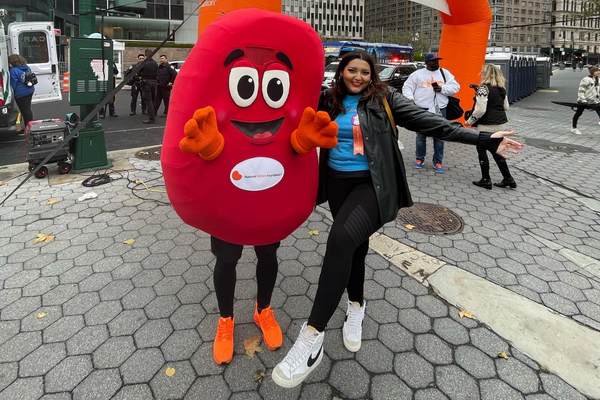January 31, 2023
Scroll through Melanie Pina's TikTok to find a bright, funny, and genuine person detailing her life with lupus and on peritoneal dialysis. With every video, she educates her audience, finds the humor in her situation, and brings hope to countless others who struggle with kidney disease.
How did she become this beacon of hope? Read on for Melanie's inspirational story.
Melanie’s diagnosis
@melanie.pina Replying to @Josh P what’s your story? #kidneydisease #lupus #dialysis ♬ original sound - Melanie Pina
In 2018, Melanie was on summer break from her junior year of college when her mother suggested she get blood work done. Having grown up getting blood work yearly, Melanie didn't think it was necessary. However, after a few months of prodding, she finally caved.
"The last time I got [blood work] done in adulthood was when I was 19. Three years had passed so my mother insisted I do it," said Melanie. "She said this in July but I didn't go until October. She wouldn't stop bugging me about it. Sometimes the best way to get someone to be quiet–especially your mom–is to just do it."
No one expected the results to reveal issues with Melanie's kidneys. She didn't have high blood pressure, problems with blood sugar, or a family history of kidney disease.
"As a first-generation Hispanic with Honduran parents, college was one of the most important things I could do. So, my doctor telling me I had to stay here for more testing was harder to hear than having health problems. I was so focused on my education, getting a good job, and helping my parents retire," Melanie said. "Eventually, I had a kidney biopsy that confirmed I had lupus and lupus nephritis. My kidneys were at stage 3b."
Melanie's doctor put her on steroids and instructed her to eat less protein and salt to help maintain kidney function for as long as possible.
"I got used to eating a lot of things without salt. Cutting protein was the hardest lifestyle change even though I wasn't a heavy meat eater," Melanie said. "The steroids made me gain weight. I used to be about 210 pounds–curvy and cute. Then I blew up like crazy, which didn't make sense since I wasn't eating much."
Despite these difficulties, Melanie persevered, finishing her degree at a school closer to home in 2019 and finding a new job.
Get tips to help you maintain a kidney disease diet.
From kidney disease to kidney failure
@melanie.pina What’s your routine like? I’m definitely a night shower person #kidneywarrior #pddialysis #dialysis #hemodialysis ♬ Love You So - The King Khan & BBQ Show
Everything went well until Melanie was laid off in January 2021 due to COVID-19.
"I had to take on a very stressful, low-paying job, which caused my lupus to flare up and kidney function to fall from 20% to 15% in less than six months," Melanie said. "My doctor also moved, so I got a new one. It ended up being a blessing in disguise. My new doctor insisted on seeing me every three weeks instead of every three months and took me off the steroids. He informed me that I would need to start dialysis if my function hit 10% or lower."
By July 2021, Melanie had dropped thirty pounds allowing her to get onto the kidney transplant list. Unfortunately, she also went into kidney failure and had a catheter surgically placed in her stomach so she could start peritoneal dialysis (PD).
"PD surgery is no joke, and I was in a lot of pain afterward. The training was also scary and felt weird at first but my nurses were very patient and kind," Melanie said. "It took about three months to feel confident enough to do it myself."
Melanie grew more confident in her treatments but also began gaining the weight she had worked so hard to lose. The sugar-based solution used in peritoneal dialysis made it extremely difficult to stay at the correct weight despite eating healthily and exercising. In April 2022, Melanie's transplant listing was put on hold until her body mass index, BMI, went down.
Do you need help getting on the kidney transplant list or finding a living donor? Our Kidney Learning Center can help. Sign up for First Steps to Transplant and Finding a Living Donor to get started.
Finding purpose and community
@melanie.pina If I could get a dollar for everytime I’ve heard this #dialysis #dialysiswarrior #pddialysis #davita #lupus #lupuswarrior ♬ Cartoon Eye Blinking Sound - Anna
Melanie was more depressed and anxious than ever: "Latinos have a stigma around mental health, so I felt alone. I was in pain and exhausted. I struggled with a foggy brain and no one understood what I was going through."
She turned to TikTok for distraction.
"I always liked social media, and I'm very creative, so I made make-up videos. Then someone told me that drinking more water would cure my kidney disease, which is not true," Melanie said. There was a trend with a blinking sound that I thought would be funny to pair with that sentiment. I thought no one would see it, but it was my first viral video. I think others with or around kidney disease got the joke because they also receive a lot of bad advice from well-intentioned people."
Suddenly, people all over the platform related to Melanie and began sharing their own kidney disease stories in her comment section of her videos and the unsolicited advice they received from strangers and family members.
"I started finding my groove. Once I grew to 1000 followers, TikTok enabled my live streaming feature," Melanie said. "It was amazing to be able to talk to people, answer more questions, and do dialysis live. I found this entire community. It was the first time I felt seen and understood."
With community support, Melanie began to feel better and decided to get weight loss surgery. It worked! As of December 2022, she was placed back on the transplant list: "TikTok saved my life. I learned so much from the community. They made me realize that life was worth living."
Melanie returns this favor to the TikTok community every time she uploads a new video. By sharing her vulnerabilities, triumphs, and struggles, she helps others feel less alone and more in control of their own kidney disease story.
Are you coping with kidney disease? NKF Peers can connect you with another kidney patient who can answer questions, provide support, or simply talk to you. Sign up to get matched with a mentor.


















